Table of Contents
Piperine is an alkaloid extracted from Black Pepper (Piper Nigrum). And used to increase the bioavailability and metabolism of nootropic supplements and drugs.
Piperine was discovered in 1819 by Hans Christian Ørsted who isolated it from Piper Nigrum. This is the same Danish chemist who figured out that electric currents create magnetic fields.[i]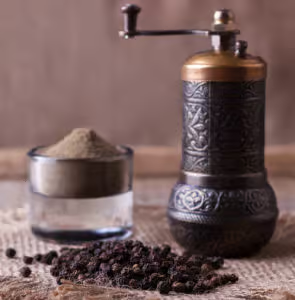
Piperine makes nootropics and pharmaceuticals more bioavailable by inhibiting the drug transporter P-glycoprotein, and the major drug-metabolizing enzyme CYP3A4 active primarily in your liver.[ii]
Piperine does more than just boost the action of your nootropic stack. It acts as a nootropic as well. In this article we investigate how Piperine can help optimize your brain.
Piperine helps:
- Nootropic Effectiveness. Piperine inhibits the drug transporter P-glycoprotein, and the drug-metabolizing enzyme CYP3A4 in your liver. Allowing more of each nootropic in your stack to be absorbed and used as intended.
- Neurotransmitters. Piperine is a powerful monoamine oxidase (MAO) inhibitor (MAOI). Boosting serotonin, dopamine and norepinephrine levels in the brain. Decreasing anxiety, improving mood and memory.
- Neuroprotection. Piperine has potent antioxidant, anti-inflammatory, and anti-tumor capabilities. Helping to reduce toxic free radicals and protecting your brain from oxidative damage.
Overview
Piperine is an alkaloid extracted from Piper Nigrum (Black Pepper). And used to boost the effectiveness of other nootropics and drugs.
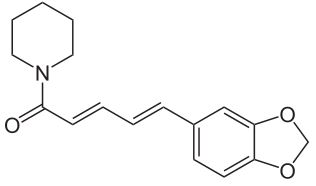
Black Pepper (Piper Nigrum) is a flowering vine native to south India. Its dried fruit is used world-wide as a spice and seasoning.
Research has found Piperine can protect against oxidative damage by inhibiting free radicals and reactive oxygen species. Piperine protects against oxidative stress. And has been found to have anti-mutagenic and anti-tumor capabilities.[iii]
But Piperine’s biggest claim to fame is its ability to boost the effectiveness of your nootropic stack.
Piperine’s effects are similar to grapefruit juice and St. John’s wort. It inhibits the drug transporter P-glycoprotein, and the major drug-metabolizing enzyme CYP3A4. Amplifying the effect of nootropics by preventing elimination in your liver and urine. And allowing increased absorption for use by your body and brain.
How does Piperine work in the Brain?
Piperine boosts brain health and function in several ways. But two in particular stand out.
- Piperine is an anti-depressant. Piperine is a monoamine oxidase (MAO) inhibitor (MAOI). Piperine inhibits both MAO-A and MAO-B. Research has found that Piperine is as effective as the popular pharmaceutical antidepressant Prozac® (fluoxetine).[iv]
Piperine has a profound effect on serotonin in the brain. Piperine has been shown in the lab to provide a substantial increase in serotonin (5-HT) in both the hippocampus and frontal cortex.[v]
And this is where it gets very interesting. Scientists found that combining Piperine with Resveratrol provided significant antidepressant action. But this stack also offered relief from oxidative stress, inflammation and provided neuroprotection.[vi]
Resveratrol on its own is a good antidepressant. And Piperine also provides antidepressant action as a MAO Inhibitor and serotonin booster. When combined, Piperine also boosts the bioavailability of Resveratrol. This combination is a potent natural antidepressant. Without the side effects that come with prescription MAOI’s and SSRI’s.
- Piperine boosts bioavailability. Piperine inhibits the drug transporter P-glycoprotein, and the major drug-metabolizing enzyme CYP3A4. This can have profound implications on how well and how much of each nootropic in your stack actually gets to your brain.
Your liver protects you by attaching a glucuronide molecule to nootropics (and drugs) which sends a signal for them to be excreted in your urine. This process prevents excessive levels of nootropic supplements (and drugs) in your body. But it can also work against your brain optimization goals.
A great example is curcumin, the bioactive compound found in turmeric. You will not experience the medicinal properties of curcumin when taken on its own. Curcumin has very poor bioavailability when taken as a supplement because of its rapid metabolism in your liver and intestinal wall.
Researchers in India gave mice 2 grams/kilogram of curcumin and tested blood levels over 4 hours. Very small amounts of curcumin were detected in blood in the first 2 hours.
The scientists then administered the same amount of curcumin combined with 20 mg/k of Piperine. Blood levels of curcumin were detected sooner with Piperine added. And stayed in the blood longer. Bioavailability of curcumin in mice increased by 154% when combined with Piperine.
The researchers then tried the experiment with humans. A 2-gram dose of curcumin on its own was not detectable in blood samples. But curcumin combined with Piperine in humans made a profound difference.
2-grams of curcumin combined with 20 mg of Piperine in humans showed up in blood samples within 15 minutes. And Piperine increased the bioavailability of curcumin by 2000%.[vii]
How things go bad
The job of our liver is to clear our body of unwanted compounds and toxins. And excrete them as waste through our urine. But some of the nootropics and especially prescription drugs are seen as “foreign matter” by our liver. And are eliminated as ‘waste’ even if our intention was to benefit our body and brain.
To make matters even worse, include getting older. Our brain chemistry and energy metabolism changes.
↓ Serotonin, dopamine and norepinephrine levels decline
↓ Recall, reaction time and mood diminish
↓ Toxins, oxidation and free radicals damage neurons
↓ Brain cell membranes degenerate
↓ Bioavailability of nootropics and supplements decline
All of these changes can happen at any age. And some are contributing factors to the neurodegenerative diseases of aging, including Alzheimer’s and dementia.
This is where Piperine can help.
Piperine to the rescue
Research from hundreds of studies have shown that Piperine will:
- Boost the bioavailability of nootropics
- Increase the effectiveness of nootropics
- Work as an antidepressant
- Relieve oxidative stress
- Prevent inflammation
- Provide neuroprotection
- Protect against tumors and cancers
How does Piperine feel?
Piperine on its own has antidepressant capabilities. So you may feel your mood improve.
If you are using curcumin or turmeric for its anti-inflammatory benefit, you’ll likely find that these supplements will be much more effective in relieving pain by adding Piperine.
You should notice a substantial benefit in the effectiveness of most nootropics and prescriptions meds when stacked with Piperine.
Some neurohackers report a reduction in anxiety (that can be caused by some supplements) by taking it with Piperine.
If you are dealing with arthritis you may find pain levels will decrease by using Piperine. This nootropic is a potent anti-inflammatory even on its own.
You may be able to reduce the amount of some nootropics and medications by stacking them with Piperine. Because the effectiveness of most of these supplements and meds will get a boost by combining them with Piperine.
The Research
Piperine Potentiates the Effects of Curcumin
Stress in everyday life puts every one of us in danger of developing some type of cognitive disorder. And curcumin is a proven therapy to help protect us from this assault on our cognition and brain health.
To help illustrate what happens in our brain when under stress, scientists subjected male Laca mice to stress-induced cognitive impairment for 28 days.
Chronic stress impaired memory, locomotor activity, elevated toxins like nitrate, decreased the master antioxidant glutathione, damaged mitochondria enzyme function, reduced acetylcholine levels, and increased stress cortisol levels.
Researchers then treated the mice with either 200 or 400 mg/k per day of curcumin. All of the damage caused by stress was reversed to a certain extent.
Then the team added 20 mg/k of Piperine to a reduced daily curcumin (100 or 200 mg/k) supplement. The results clearly demonstrated that Piperine enhanced the bioavailability of the curcumin. And greatly potentiated the effects against stress-induced cognitive impairment.[viii]
Piperine as an Antidepressant
Researchers injected mice with 60 mg/k of Piperine. An hour after the injection, the team measured serotonin, dopamine and norepinephrine levels. Serotonin levels were significantly higher in the cerebral cortex of the mice. Dopamine levels were markedly higher in the hippocampus, midbrain and cerebellum. And norepinephrine levels were lower in every part of the brain.[ix]
Scientists in Korea analyzed Piperine (ethanol extract) for its monoamine oxidase (MAO) inhibitor capabilities. Piperine showed an inhibitory effect against MAO-A and MAO-B.
The team found that Piperine exhibited the same type of antidepressant effect in the brain as the popular prescription drug Prozac® (fluoxetine).
The researchers concluded that Piperine possesses potent anti-depressant properties. And Piperine is a promising pharmacotherapeutic candidate as an antidepressant agent.[x]
Piperine Protects Against Alzheimer’s
A study conducted in Thailand looked at Piperine’s effect on memory and neurodegeneration in an animal model of Alzheimer’s Disease.
Adult male Wistar rats were given Piperine at doses ranging from 5, 10 and 20 mg/k of body weight for 2 weeks before and 1 week after artificially induced Alzheimer’s-like conditions in the rat’s brain.
The results showed that Piperine at all dosage ranges significantly improved memory impairment and neurodegeneration in the hippocampus.
The scientists speculated the mechanism of action for Piperine to produce these effects could be a decrease in lipid peroxidation and the acetylcholinesterase enzyme. (This enzyme degrades acetylcholine synthesis in the brain). Piperine also demonstrated a neurotrophic effect in the hippocampus.[xi]
Dosage Notes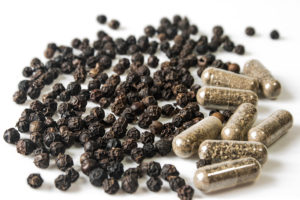
The recommended dosage of Piperine to enhance bioavailability of nootropic supplements is 5 – 20 mg per day.
Many nootropic stacks and some supplement formulas (i.e. curcumin, turmeric and resveratrol) come pre-stacked with the appropriate dose of Piperine.
For example, Performance Lab® Energy uses the patented BioPerine® form of Piperine in their premium energy stack.
I love this energy stack and use it twice a day instead of the morning and noon doses of ALCAR I used in the past.
This pre-formulated nootropic stack also includes the patented forms of MicroActive® Q10, BioPQQ®, and Bio-enhanced® Na-RALA (alpha lipoic acid).
You can see my full review here of how I use the Performance Lab Energy stack in treating Adult ADD.
Side Effects
Piperine is an extract of Black Pepper and considered non-toxic and safe to use at recommended doses.
Piperine potentiates the effect of nearly all nootropic supplements and prescription medications. So be very aware that boosting the effects of certain supplements or drugs could produce unwanted consequences.
Be cautious of using Piperine in addition to Piperine that may already be in one or more of your supplements. Too much Piperine will not only amplify most of the supplements and drugs you’re taking. But could also negate the effects of some.
Available Forms
BioPerine® is a patented form of Piperine made by Sabinsa Corporation. And licensed to other supplement manufacturers to include in their formulas, or as a standalone product. It’s the only source I’m aware of who have clinical studies to back up their claims of safety and efficacy.
You can also get Piperine by grinding black peppercorns on your food. The problem is there is no way to measure how much Piperine you’re actually using.
Nootropics Expert Recommendation
Piperine up to 20 mg per day
 We recommend using Piperine as a nootropic supplement.
We recommend using Piperine as a nootropic supplement.
Your body does not make Piperine on its own. So you must take it as a supplement.
Piperine is especially helpful for boosting the bioavailability of other nootropics in your stack.
Beware that Piperine also amplifies the potency of other supplements and meds you are taking. Boosting the effect of certain SSRI’s and some other meds could be extremely dangerous.
Piperine is also an effective antidepressant, and can help lower stress and anxiety. Piperine is a potent anti-inflammatory and could help reduce pain if you are dealing with arthritis. Or other conditions caused by excess inflammation in your body.
Piperine is a powerful neuroprotectant and makes a great addition to any nootropic stack.
You can buy Piperine or BioPerine® as an individual supplement. And some premium pre-formulated nootropic stacks like Performance Lab® Energy include BioPerine.

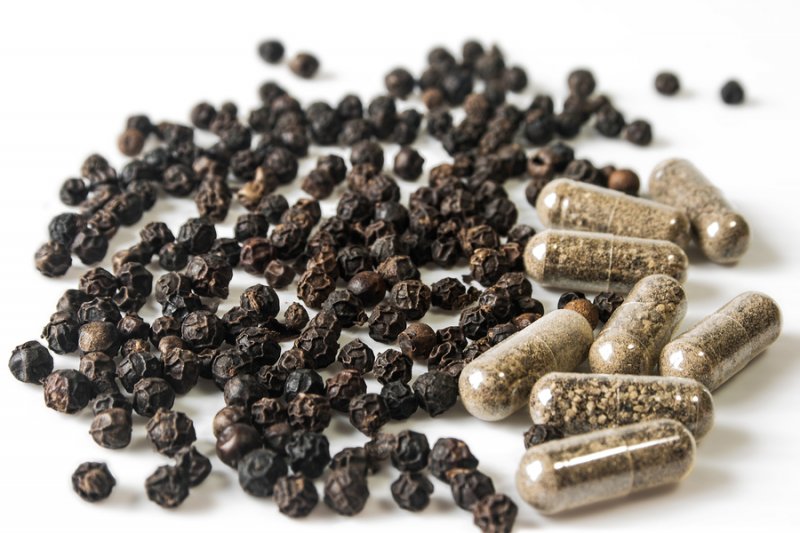
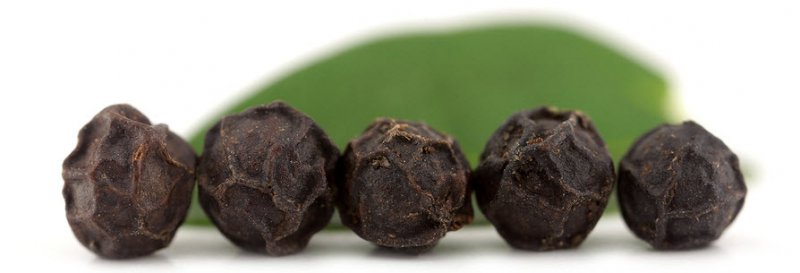

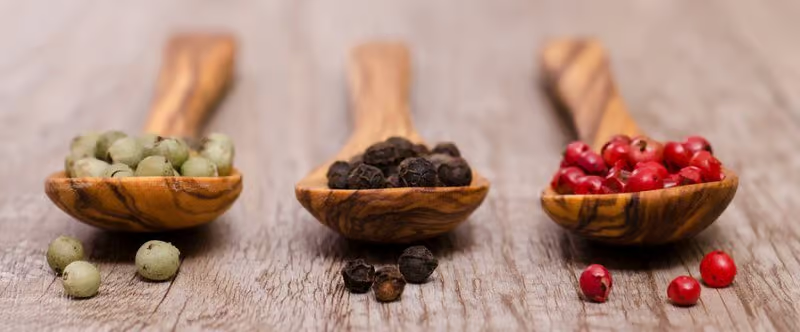





Join The Discussion - 79 comments
Robert
December 17, 2024
Is there an interaction between piperine and cannabidol?
David Tomen
December 22, 2024
Robert this study shows about a 2.5-fold increase in oral bioavailability of CBD compared to control group without piperine (https://pubmed.ncbi.nlm.nih.gov/32198013/).
Robert
April 29, 2023
Hi David,
Is it safe to take piperine together with Glycine or Gaba? Will piperine also enhance the effects of CBD oil and Taurine?
David Tomen
May 1, 2023
Robert, if any of those supplements use the enzyme CYP3A4 for metabolizing that supplement it means it will increase the potency of that supplement.
But you’ll need to do your own research for each because that is not something I include in any of the reviews for each of those supplements. But in general, even if Piperine increased the potency of any of them it shouldn’t be a problem. Drugs on the other hand are more of a concern if you mess with how they work in your system.
Robert
May 1, 2023
Thank you so much for your reply!
I`m currently taking this stack in the morning:
Mucuna Puriens 400mg
Ashwagandha 500mg
Ginger 450mg
Curcuma 750mg
Vitamin E 400mg
Omega 3 500mg
Vitamin B6
Taurine 500mg
Gaba 200mg
Creatine 2g
Magnesium 150mg
Probiotic complex
Dimethylglycine (DMG) 125mg
I’m going to add 15mg of Piperine to it.
Thanks!
James
April 28, 2023
Hey Dave,
Am also a little confused about Piperine dosage amounts in relation to your recommendation:
e.g. if I have a supplement that has:
* Piper nigrum (black pepper) fruit ext. dry conc. Std. 450 micrograms
** equiv. to dry fruit 9.23 mg (min)
*** equiv. to Piperine 430 micrograms
Should I deem that to be 9mg Piperine? Or 430 micrograms Piperine?
Thanks 🙂
David Tomen
May 2, 2023
James, it looks like it would be 430 mcg Piperine which is a very low dose. Not enough to be effective for potentiating the absorption and/or use of certain drugs and supplements.
James
April 27, 2023
Hey Dave,
Just wondering, is there any harm in having more than 20mg Piperine a day?
Thanks 🙂
David Tomen
May 2, 2023
James, no harm but once you inhibit those liver enzymes it is pointless to use more Piperine. You can’t make them more inhibited. They either work or you turn them off with Piperine.
Harry Rourke
March 31, 2023
Hi David,
Could 20mg Piperine interact with the SSRI Zoloft/Sertraline and cause Serotonin Syndrome?
Kind Regards,
Harry Rourke
David Tomen
April 1, 2023
Harry, it would likely take more than 20 mg Piperine to cause Serotonin Syndrome but that is just a guess because it has not been studied. But you do not need to use such a high dose of Piperine for it to be effective. 5 – 10 mg is enough.
Blaine
December 25, 2022
Can you safely use this while prescribed a benzo for anxiety?
David Tomen
December 26, 2022
Blaine, using Piperine while using Benzos will likely potentiate the effects of the benzos.
James
December 12, 2022
Hey David,
Given you said there was a similarity between piperine and grapefruit in terms of effecting medication absorptions, I was curious whether piperine would be safe with an amphetamine stimulant like Vyvanse; especially since grapefruit is usually a big no no with amphetamine meds.
I can definitely say that a tiny bit of black pepper with my Vyvanse dose gives it a bit of an extra kick, and even having some black pepper several hours after can still give me quite the jolt!
Also, does piperine have any effect on libido too? I’ve personally found black pepper can give me a strong immediate libido boost.
David Tomen
December 12, 2022
James, Piperine is going to potentiate the effectiveness of most drugs including prescription stimulants. So you may need to adjust your dose of the stimulant.
Piperine also acts like an MAOI which includes boosting the effectiveness of dopamine in your system. Which should also boost libido.
James
December 12, 2022
Thanks for such a quick reply, much appreciated 🙂
So I get that it’s going to potentiate medications but is it actually safe to use with amphetamine stimulants?
And also when it comes to its ability to potentiate medications and nootropics, is there any way to ascertain how big of a potentiation a particular Piperine dose would have? e.g. as in 20mg Piperine boosts these specific medications/nootropics by x %?
I know about its effect on Turmeric but was curious if there was anything published on its effects on another medications/nootropics?
Or is it more trial and error as to how adding Piperine affects you and affects any medications etc you’re taking?
David Tomen
December 16, 2022
James, it’s more trial and error than anything. I use BioPerine when I use Curcumin and it has not had any negative effect on my use of Ritalin.
Andrew Richardson
December 9, 2022
I Just want to make sure taking piperine 10MG is safe long term would there be any side effects if I stopped suddenly cause it mentions is like an anti-depressant or monoamine oxidase (MAO) inhibitor (MAOI).
So I’m taking Astaxanthin at 10MG and DHA 1000MG and vitamin D 2000UI and Taurine 2 grams daily as my every day always stuff as I’m doing my best to keep inflammation low in my brain I am NOT on any type of SSRI at all
David Tomen
December 10, 2022
Andrew most ‘natural’ supplements to cause withdrawal when abruptly quitting them. I’ve gone off of BioPerine several times for various reasons. Usually because I ended up in the hospital and could not get access to my supplements. There has never been a problem with withdrawal or side effects from stopping them suddenly.
Andrew Richardson
December 13, 2022
I dont quiet understand what monoamine oxidase (MAO) inhibitor (MAOI) means but this does not block serotonin reuptake or anything like that does it, just improves the function of existing neurotransmitters
David Tomen
December 16, 2022
Andrew, it’s more complicated than that but in the most basic sense it will make the catecholamines currently in your brain work more effectively.